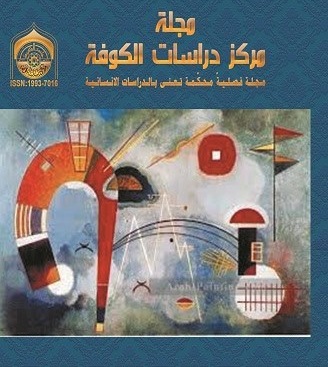البعد الصوتي في النحو العربي حتى نهاية القرن الرابع الهجري - دراسة في ضوء البعد الاجتماعي
DOI:
https://doi.org/10.36322/jksc.v1i60.32Keywords:
لا يوجدAbstract
The apartment cannot be separated between grammar and sound, although some modernists have reduced the importance of the connection of grammar with sound to the ancients, as they said: (( It is rare to find in ancient grammar books who indicate the link between a grammatical phenomenon and an audio one, although Many of the phenomena of grammar can be explained only on the basis of phoneme)) , and others consider that the linking of phonemic phenomena to the meaning, i.e., the claim that certain voices denote or imply certain meanings, an issue on which scholars have not agreed , and finds Others said that the phonological study was attached to grammar as neither a precursor to it, nor specific to its understanding as it should be, and that it came at the end of the book , so the reader does not see it until after the completion of grammar and drainage, and it is evidence that the grammarians did not appreciate the relationship between Sounds and grammar, and this is due to two reasons: The first is that the reciters have been assigned the phoneme to adjust the Quranic text. Because Quranic readings were frequent with oral recitation, and the result was that the refinement of the Qur’anic text leads to an attempt to translate phoneme in terms of exits and attributes, and grammatical readers may not have other readers who created this phonetic description of exits and attributes of letters, and then they delivered this description to Their successors are grammatical, unreadable. The second reason is that when grammarians began their grammatical notes on the language, they encountered the Arabic language in writing, and writing in any language cannot stabilize and fulfill its purpose unless the authors of this line and the rules of spelling are intuitive and aware of the phonemic system of the language .
We should not be completely reassured by what the hadiths indicated that there is a difference in estimating the relationship between grammar and sound by noting the reasons that they referred to, and they themselves decide that most of the readers who created the audio description of the letter exits and their attributes are grammatical, and when they are concerned with describing the phonetic aspect of the letter exits and their attributes And its effect on directing the Qur’anic readings has found in it enough from other grammatical texts, and perhaps fulfilled, even if it was not for the sake of abundance, an important aspect of the language based on what is considered in the Qur’anic texts. Written, and the written speech does not perform the purpose entrusted to it unless his family has intuition and awareness, so I think that this does not hold up to whoever described the written language with a vocal description in my speech as Ibn Jinni did in their saying: “He will walk upon it at night” as it will come, and he has spoken the phrase On Sibawayh, he converted the written words into spoken words.
This utterance is entrusted to the zonal nature, and the verbal dialectical habits that the people of every language retain.
We conclude from this that the modernists expanded the phonological studies and took care of them, and all those entrusted with the logical nature and social behavior of the members of a society, for every time and place, as it is not hidden that the Arab has surrounded his language by making and controlling it by laws, and restricting it to rules, but there is a sense, nature or mood, It indicates that an Arab is intuitive and aware of the phonetic system of language, and cannot be industrialized, and is not limited to a standard. Therefore, the research attempt to prove that relationship comes with the social dimension, which stems from the choice of the Alvina researches, it is necessary to receive the attention of the study.
Downloads
Downloads
Published
How to Cite
Issue
Section
License
Copyright (c) 2022 Kufa Studies Center Journal

This work is licensed under a Creative Commons Attribution 4.0 International License.
Permit others to distribute and copy the manuscript, to create extracts, abstracts, and other revised versions, adaptations, or derivative works of or from the manuscript (such as a translation), to include in a collective work, to text or data mine the article, even for commercial purposes, as long as they credit the author(s), do not represent the author as endorsing their adaptation of the article, and do not modify the article in such a way as to damage the author''''s honor or reputation. Further details are found at Creative Commons Attribution 4.0 International (CC BY 4.0)






























